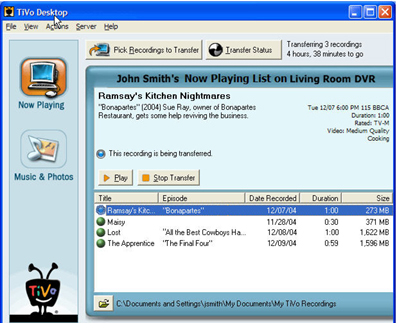Cablevision's DVR move will force TiVo's hand


Long Island, N.Y.-based Cablevision said today that it would launch a 60-day test of its RS-DVR (Remote Storage-Digital Video Recorder) in its home market soon. A full, 2.1 million-subscriber system roll-out is expected later this year.
RS-DVR will make it possible for subscribers to record programs directly into their set-top box, without the need for a stand-alone digital video recorder such as TiVo.
There are digital rights concerns which may or may not need to be negotiated. Yet apart from that, I have to ask the question: where does this leave TiVo?
After all, variations on this technology are spreading to other cable companies (such as Time Warner Cable, created a service it calls "Startover," which lets viewers who miss parts of a live program to start from the beginning if the show is still in progress). And of course, there's Comcast On-Demand, which offers selected programming for later viewing.
I think it is plain to see the distribution model for recording televised content is shifting away from stand-alone devices. It appears that TiVo recognizes this. I already see a shift away from a dominant business model of a separately sold service and device that lets you record programs directly from your tv and then watch them there.
I believe that to survive, TiVo will place even greater emphasis on services such as Tivo Desktop software and TiVoMusic Player where you can transfer programs to your PC (shown at the top of this post) or configure and program your desktop as a jukebox.
Look:
Don't let me forget TiVo To Go, where you can transfer shows to your laptop and burn them on DVD.
Like here:
I question,though, whether the marketing voice that TiVo is using these days places enough emphasis on these newer services to overcome TiVo's legacy identity among consumers as a box tied in to a recording service.
Still, I believe the necessary recalibration of TiVo's marketing message is only a transitory phase.
I think that these digital aggregation services will ultimately prove too tempting for a larger content aggregator to resist. Google, Yahoo! or AOL, beach of which are increasingly prominent players in the digital content aggregation space. Each would be a suitable acquirer.